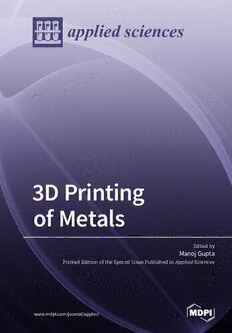
3D Printing of Metals. PDF
Preview 3D Printing of Metals.
applied sciences 3D Printing of Metals Edited by Manoj Gupta Printed Edition of the Special Issue Published in Applied Sciences www.mdpi.com/journal/applsci 3D Printing of Metals 3D Printing of Metals SpecialIssueEditor ManojGupta MDPI•Basel•Beijing•Wuhan•Barcelona•Belgrade SpecialIssueEditor ManojGupta NationalUniversityofSingapore Singapore EditorialOffice MDPI St.Alban-Anlage66 4052Basel,Switzerland This is a reprint of articles from the Special Issue published online in the open access journal AppliedSciences(ISSN2076-3417)from2017to2018(availableat: https://www.mdpi.com/journal/ applsci/specialissues/3DMetalPrinting). Forcitationpurposes,citeeacharticleindependentlyasindicatedonthearticlepageonlineandas indicatedbelow: LastName,A.A.; LastName,B.B.; LastName,C.C.ArticleTitle. JournalNameYear,ArticleNumber, PageRange. ISBN978-3-03921-341-2(Pbk) ISBN978-3-03921-342-9(PDF) (cid:2)c 2019bytheauthors. ArticlesinthisbookareOpenAccessanddistributedundertheCreative Commons Attribution (CC BY) license, which allows users to download, copy and build upon publishedarticles,aslongastheauthorandpublisherareproperlycredited,whichensuresmaximum disseminationandawiderimpactofourpublications. ThebookasawholeisdistributedbyMDPIunderthetermsandconditionsoftheCreativeCommons licenseCCBY-NC-ND. Contents AbouttheSpecialIssueEditor . . . . . . . . . . . . . . . . . . . . . . . . . . . . . . . . . . . . . . vii ManojGupta SpecialIssue:3DPrintingofMetals Reprintedfrom:AppliedSciences2019,9,2563,doi:10.3390/app9122563 . . . . . . . . . . . . . . . 1 FangLi,ShujunChen,JunbiaoShi,HongyuTianandYunZhao EvaluationandOptimizationofaHybridManufacturingProcessCombiningWireArcAdditive ManufacturingwithMillingfortheFabricationofStiffenedPanels Reprintedfrom:AppliedSciences2017,7,1233,doi:10.3390/app7121233 . . . . . . . . . . . . . . . 3 FangLi,ShujunChen,JunbiaoShi,YunZhaoandHongyuTian Thermoelectric Cooling-Aided Bead Geometry Regulation in Wire and Arc-Based Additive ManufacturingofThin-WalledStructures Reprintedfrom:AppliedSciences2018,8,207,doi:10.3390/app8020207. . . . . . . . . . . . . . . . 17 ZhehanChen,XianhuiZong,JingShiandXiaohuaZhang Online Monitoring Based on Temperature Field Features and Prediction Model for Selective LaserSinteringProcess Reprintedfrom:AppliedSciences2018,8,2383,doi:10.3390/app8122383 . . . . . . . . . . . . . . . 29 Iain McEwen, David E. Cooper, Jay Warnett, Nadia Kourra, Mark A. Williams and GregoryJ.Gibbons Design&ManufactureofaHigh-PerformanceBicycleCrankbyAdditiveManufacturing Reprintedfrom:AppliedSciences2018,8,1360,doi:10.3390/app8081360 . . . . . . . . . . . . . . . 45 MattiManninen,MarikaHirvima¨ki,Ville-PekkaMatilainenandAnttiSalminen Comparison of Laser-Engraved Hole Properties between Cold-Rolled and Laser Additive ManufacturedStainlessSteelSheets Reprintedfrom:AppliedSciences2017,7,913,doi:10.3390/app7090913. . . . . . . . . . . . . . . . 61 Seungkyu Han, Matthew Zielewski, David Martinez Holguin, Monica Michel Parra and NamsooKim Optimization of AZ91D Process and Corrosion Resistance Using Wire Arc Additive Manufacturing Reprintedfrom:AppliedSciences2018,8,1306,doi:10.3390/app8081306 . . . . . . . . . . . . . . . 75 YongGaoandMingzhuoZhou Superior Mechanical Behavior and Fretting Wear Resistance of 3D-Printed Inconel 625 Superalloy Reprintedfrom:AppliedSciences2018,8,2439,doi:10.3390/app8122439 . . . . . . . . . . . . . . . 87 Sung-UkZhang Degradation Classification of 3D Printing Thermoplastics Using Fourier Transform Infrared SpectroscopyandArtificialNeuralNetworks Reprintedfrom:AppliedSciences2018,8,1224,doi:10.3390/app8081224 . . . . . . . . . . . . . . . 102 SuchanaAkterJahanandHazimEl-Mounayri AThermomechanicalAnalysisofConformalCoolingChannelsin3DPrintedPlasticInjection Molds Reprintedfrom:AppliedSciences2018,8,2567,doi:10.3390/app8122567 . . . . . . . . . . . . . . . 111 v About the Special Issue Editor Manoj Gupta, Dr., was a former head of the Materials Division of the Mechanical Engineering Department and director designate of the Materials Science and Engineering Initiative at NUS, Singapore. He received his Ph.D. from the University of California, Irvine, USA (1992), and was a postdoctoral researcher at the University of Alberta, Canada (1992). In August 2017, he was highlightedamongthetop1%ofscientistsintheworldbyTheUniversalScientificEducationand ResearchNetworkandamongthetop2.5%ofscientistsasperResearchGate. Heiscreditedwith (i)thedisintegratedmeltdepositiontechniqueand(ii)thehybridmicrowavesinteringtechnique,an energy-efficient,solid-stateprocessingmethodtosynthesizealloys/micro/nanocomposites. Hehas published over525 peer-reviewedjournal papersand ownstwo USpatents andone trade secret. His current h-index is 61, RG index is >47, and citations are greater than 14,000. He has also co-authored six books that have been published by John Wiley, Springer, and MRF, USA. He is Editor-in-Chief/Editoroftwelveinternationalpeer-reviewedjournals. In2018hewasannounced World Academy Championship winner in the area of Biomedical Sciences by the International AgencyforStandardsandRatings.Amultipleawardwinner,heactivelycollaborateswithandvisits Japan, France, SaudiArabia, Qatar, China, USA,andIndiaasavisitingresearcher, professor, and chairprofessor. vii applied sciences Editorial Special Issue: 3D Printing of Metals ManojGupta DepartmentofMechanicalEngineering,NationalUniversityofSingapore,9EngineeringDrive1, Singapore117576,Singapore;[email protected] Received:6June2019;Accepted:11June2019;Published:24June2019 Additivemanufacturing(AM)hasemergedasoneofthemostenablingnewmanufacturing technique;thetopichasbeenextensivelyresearchedworldwideforalmosttwodecades.Theunique capabilitiesandpotentialofvariousAMtechniqueshaveledtoalmosthomogeneousworldwide researcheffortsirrespectiveofinternationalboundaries; sucheffortshaveaimedatdevelopinga thoroughandcriticalunderstandingtoharnessthecapabilitiesofAMthatmaytranslatetoindustrial practice.Themotivebehindtheseextensiveresearchactivitieswasto: a. Optimizetheuseofmaterialstoreducewastage[1]. b. Optimizetheuseofmanpowertoenhanceefficiency[1]. c. Optimizetheuseofresourcestolimitproductiontime[2]. Bothglobalgovernmentsandtheprivatesectorhaveinvestedbillionsofdollarstodevelop AMtechniquestorealizethegoalofenablingsustainabilityaswellasaprofitablemanufacturing route.Allthreecategoriesofmaterials(metals/alloys,polymers,andceramics)havebeenresearched andpracticallyallapplications,whetherinengineeringorrelatedtobiomedicalfields,havebeen equallytargeted. Tofurtherthiscause, aSpecialIssuewaslaunchedintheMDPIjournal‘AppliedSciences’, whichsoughtoriginalcontributionstodevelopfurtherunderstandingofthisfascinatingareaof manufacturing. A total of nine articles were accepted after a rigorous peer review process and subsequentlypublished.Overall,thepapersaddressed: a. AMprocesscontrol/optimizationincludingaspectsofonlinemonitoring[1,3,4] b. ComparisonstudieswithexistingmanufacturingmethodstovalidatetheacceptabilityofAM[5] c. Productdesignanddevelopment[6] d. PropertiesimprovementusingAMtechniques[7] Many AM techniques have been developed over last two decades; the work done thus far hasenabledcurrentresearcherstounderstandboththescientificandtechnicalcapabilitiesandthe limitationsofthesetechniques. Accordingly,researchershavebeenclearintheirselectionofAM techniques,choiceswhichhavebeenprimarilygovernedbymaterialandendapplications. ThearticlescollectedinthepresentSpecialIssueindicateanemphasison: a. Metal-basedmaterialsincludingstainlesssteels,magnesiumalloys,andnickel-basedalloys[4,5,7]. b. Polymer-basedmaterials[8,9]. TheindustrialsectorswhicharelikelytobenefitfromthestudiespresentedinthisSpecialIssue includebutnotlimitedtothefollowingsectors: a. Construction b. Transportation,includingautomobileandaerospacesectors c. Nuclear d. Biomedical Appl.Sci.2019,9,2563;doi:10.3390/app9122563 1 www.mdpi.com/journal/applsci
